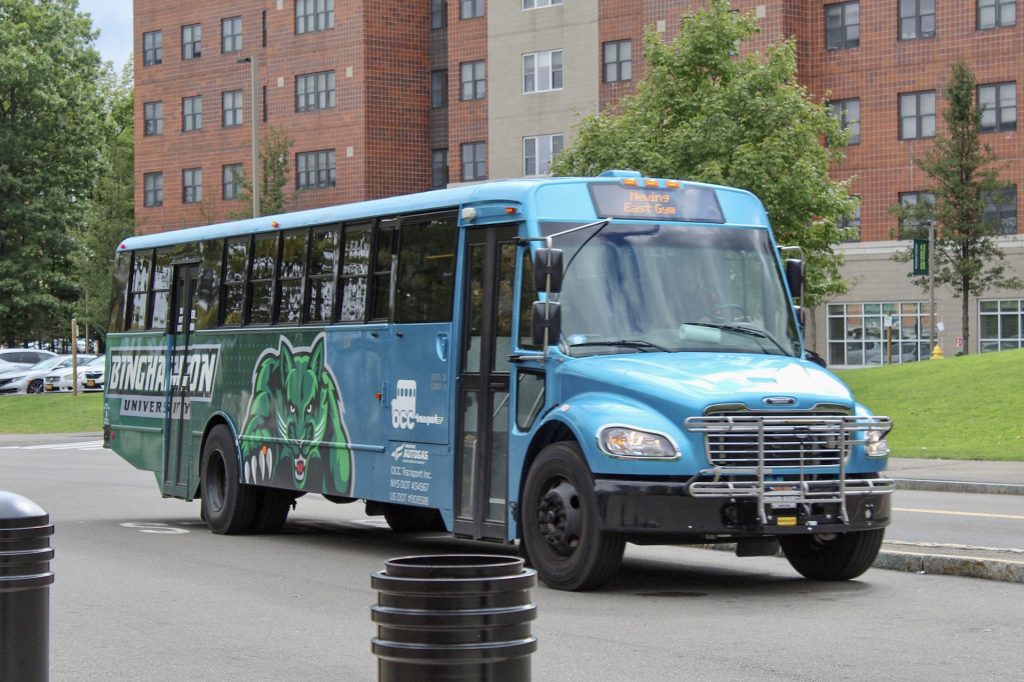Binghamton University’s Off Campus College Transport’s (OCCT) Late Nite service has returned with new conditions.
After an almost three week hiatus, Late Nite service was reinstated on Sept. 29 with new safety measures. According to an announcement from the Student Association (SA) Executive Board, Late Nite service will now include crowd control monitors and police officers at both the University Union and State Street bus stops. Students who put drivers and other students in danger will now be banned from using OCCT services and subject to applicable student misconduct charges or legal consequences.
The service was initially suspended on Sept. 9, when students attempted to forcibly open the doors of an OCCT bus, prompting a re-evaluation of current OCCT policies and procedures by the SA. Daniel Croce, a junior majoring in business administration who serves as the OCCT chief financial officer and vice president for finance of the SA, said the new protocol was inspired by the Sept. 9 event and the threat it posed toward the safety of students, drivers and buses.
“The reinstatement of Late Nite service under these new policies was born out of a need to develop solutions to the unsafe conditions that Late Nite was previously operating under,” Croce wrote in an email. “The incidents that occurred a few weeks ago sparked the temporary suspension, as OCCT and myself dived into long-term solutions to ensure the safety of all passengers and employees of OCCT. Safety is the number one priority, and the temporary suspension was developed with that in mind.”
Students frequently use Late Nite to travel to and from Downtown Binghamton, the West Side and campus during weekend nights. In an attempt to promote safety, crowd control monitors will be present at both the Union and State Street stops to ensure students board the bus safely.
Croce explained that the monitors were chosen based on their expertise and insight on managing large crowds. With the help of Jennifer Keegin, associate director for campus activities, Croce and the SA chose highly-trained event staff personnel, who have experience dealing with larger crowds at university events.
Police will also be a permanent presence at the bus stops, to limit acts of violence by students entering the bus. Students who are unable to follow the safety protocol will no longer be able to use the OCCT bus service, in addition to facing other repercussions, according to the SA announcement. For students who put drivers and other students in danger, the repercussions may include legal consequences and/or school misconduct charges, according to Croce.
“Any student who acts in a disorderly manner, including creating a safety risk, will face all applicable student misconduct charges,” Croce wrote. “Students who put other students and/or OCCT employees at risk will be identified and will have University misconduct [charges] processed against them. These students may also face any applicable legal action and possible bans from bus use.”
Many students expressed support for the safety measures, recalling their own experiences with unsafe Late Nite commutes.
Julian Kudlack, a senior majoring in geography, said he was saddened by the “needed” measures the SA has taken to keep students, and especially bus drivers, safe. Kudlack reflected on his freshman year, where he said there was a mutual respect between bus drivers and passengers, leaving him concerned about the current Late Nite service environment, but understanding of the efforts OCCT has taken to ensure safety.
“I know that getting downtown is hectic and the line can get aggressive, but people need to realize that driving a bus full of college students can be extremely stressful, especially when you’re the one who’s liable and in charge of everyone’s safety,” Kudlack said. “It’s unfortunate that these measures are needed, but it’s for the best, as bus driver and student safety alike should always be of utmost importance.”
Moss Magnusson, a sophomore majoring in philosophy, politics and law, said an unsafe bus commute is a common experience for students who use Late Nite, prompting his support of the protocol being instated.
“I’m sure we’ve all been in the line for a bus on a Friday night,” Magnusson said. “It gets aggressive, so I am not surprised that this aggression has been shifted toward these drivers. So yeah, I think these measures are necessary to keep a system up and running, that we all benefit from, and keep drivers safe.”
Croce expressed hope that the new safety measures will be a long-term solution to an ongoing problem.
“However, the success of and ability to run Late Nite service for the future [lies] in the hands of the students,” Croce wrote. “We are all students and we are all in this together! I urge students to respect themselves and others on any and all OCCT buses. We are here to keep each other safe!”



